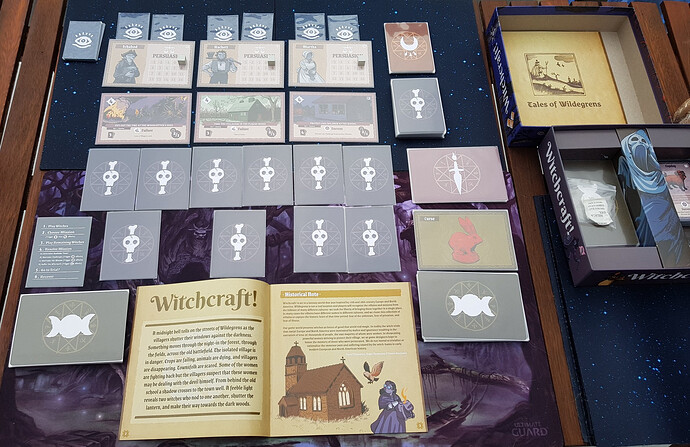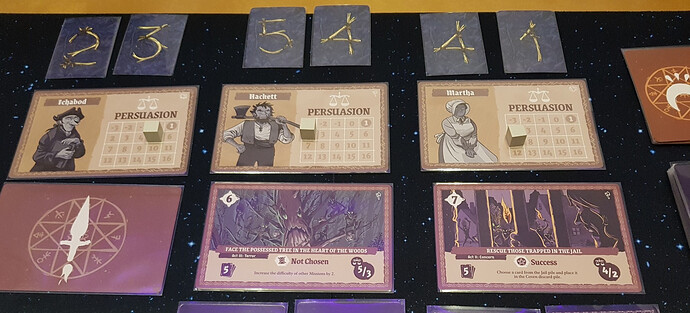I took care of that today :).
It feels a bit different to Resist for a few reasons; and it’s a more-involved set-up (although the game time greatly outweighs the set-up time).
Set-up starts with randomly selecting three “jurors” from the village deck, and you win the game if at least 2/3 of them are on your side if-and-when the witch trial takes place at the end of the game. The set of missions for that game is then specific to those jurors (each villager comes with a three-act mission sequence). Succeeding at a mission will gain you favour with any single juror of your choice, but will gain you the most for the juror it was associated with (thematically you are helping the village in a way that one of the jurors always cares about especially). The challenge cards (some good; most bad) which are randomly drawn and attached to the missions are then a mix of common challenges, and 15 juror-specific cards (5 each), so the themes you see through the course of any given game are always connected to the three villagers drawn at the start.
How much convincing each juror requires is hidden information (which you may or may not be able to uncover along the way), so when you choose to go to trial (you can lose the game in a number of ways, and it’s your call when you make a bid to win) you quite likely won’t know for sure whether you’ve done enough.
The final set-up step is to draft your coven of 12 by considering two witches at a time and selecting one. There are numerous families of varying size, and any time you get to play multiple witches from the same family on the same turn there are bonuses; so if you find yourself drafting more than one of a family, you might want to double-down on that and try to maximise the potential benefits (which in turn modifies the set of abilities you’ll end up drawing from).
Failing two missions loses you the game immediately, so with things looking very dicey in the third act I took my chances and went to trial. I’d gained almost no favour at all with juror Hackett, but I had a healthy 7 persuasion with Martha, and a rather risky 5 with Ichabod – however I knew that one of Ichabod’s two cards was a 2, so a 3 or less for the other would be sufficient. The highest card is a 6 (the worst case is 6+5 = 11), and I didn’t know any of the other values for the jurors.
I won! Not a complete victory – I had no chance at all of convincing all three – but my 5 turned out to be exactly enough for Ichabod, and Martha too had needed only 5. The one juror I’d mostly ignored turned out to be the most determined of the bunch, but fortuitously they were in the minority. (In fact I’d made a good call after one mission to improve my standing by a lesser amount with Ichabod vs attempting to gain the full favour with Hackett, as I’d seen Ichabod’s ‘2’ card by then and figured he was probably a safer bet. It could have gone either way though, so luck was certainly on my side in the end.)
Good game. Mechanically very similar to Resist!, naturally, but the thematic and gameplay changes make it feel different enough that I can see myself hanging on to them both.
A couple of my earlier reports on Resist!:

